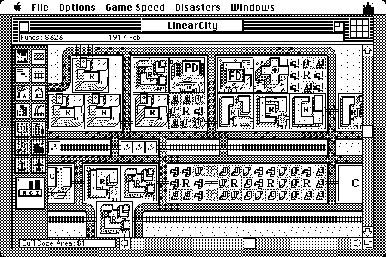Video games, on the other hand, offer the challenge of bettering yourself against computational odds, setting a goal and figuring out ever changing problems and patterns within the set confines and rules of an environment, and accomplishing them. On top of that, they are extremely effective in the instant gratification department.

But aside from game play, I am always interested in what goes into a game, how they can expand the players point of view in ways they never imagined.
I often cite Will Wright's Sim City as one of my favorite, and best video games of all time. How could a game that dealt with urban planning be any fun what so ever? Well, as a twelve year old boy, Sim City sparked something within me very few had - inspiration. I was instantly sucked in by it's possibilities and unique environment and game play. It quite simply blew the roof off of the notion of what a video game was. There had never been a game presented in this manner to me - this was one that made me think in ways I never had. I had to think about the result of performing an action within a game and how that might effect future game play, I had to make sure I had enough money in the bank to rebuild if a natural disaster occurred, I had to figure out, through trial and error, how to make the city run at a profit, so it could continue to grow. Sim City presented elements of Science, Economics, basic math and banking skills (which as an admitted life long math phobic, is something of a feat to keep me interested), and Urban Planning in the form of a "sandbox" environment that was as much fun as building a train set.
At it's heart, a game is made up of a set of rules one must follow to win or end said game. Add a set of variables (advantages, disadvantages, delays) that are put in place during game play that can keep you from accomplishing this, while another player advances, and you have the root of what makes a game "fun" or "challenging." For a long time I have adamantly opposed cheating in any form of game play with others, because I believe it offers the one, static, formula that makes up a true test of mental skill. Cheating should be reserved for real life, when we often are allowed to (and encouraged to) act in our own self interest to get ahead. In the world of gaming, this is sacrilegious. We must come to the game with our own experience, ready to test our meddle against others, on a level playing field/board/mmorpg of mental dexterity.
That's not to say cheating doesn't run rampant, everywhere, even in the gaming world, but I see it as the truest test of character of a person, on how they handle themselves in a gaming situation. Perhaps one of the few windows into a persons soul that we get in this life. Admittedly, I have found cheats or walk through to games I just can't finish on my own, or have grown tired of, but in terms of competition, I feel you must bring what you have in your head to the table (or console, or board).
The truth is that, for the most part, we don't have anything like game criticism, and we need it -- to inform gamers, to hold developers to task, and to inform our broader cultural understanding of games and their importance and impact on our culture. - Game Criticism, Why We Need It, and Why Reviews Aren't It by costikThis statement couldn't be more correct. Video games are still a relatively new teritory, in terms of criticism. While there are sites out there that are looking at games as art, most offer the thumbs up, thumbs down approach to placing a value on a game. We need to look at games as a whole - social impact, cultural implications, metaphors, and style present within. Just as a film is not a single artists work, but an amalgam of talented individuals working together towards a shared vision, so to are video games. It's time we enjoy them with both sides of our brains too.
